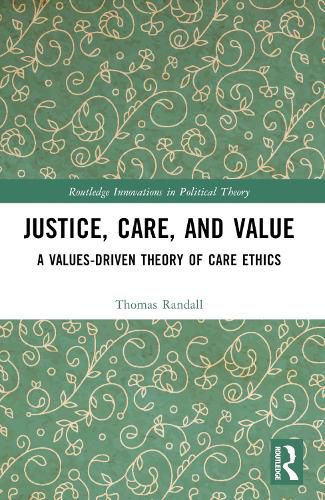Readings Newsletter
Become a Readings Member to make your shopping experience even easier.
Sign in or sign up for free!
You’re not far away from qualifying for FREE standard shipping within Australia
You’ve qualified for FREE standard shipping within Australia
The cart is loading…






In Justice, Care, and Value Thomas Randall argues for the radical potential of care ethics as a distinct and preferable theory of distributive justice.
Advancing the feminist literature, this book defends a vision of society that can best enable caring relations to flourish. Specifically, Randall proposes a values-driven theory of care ethics that derives normative criteria for evaluating the moral worth of caring relations and their surrounding institutions via a classification of the values of care. They argue that such a theory gives us unique and meaningful solutions to contemporary questions of distributive justice across personal, political, global, and intergenerational domains. In doing so, the book makes significant strides to engage care ethics with the broader moral and political philosophy literature.
Topical and interdisciplinary, Randall demonstrates that care ethics has the conceptual resources to ground distributive theories of socialism, territorial and natural resource rights, obligations to future generations, and historic redress. The book will be of great interest to academics, researchers, and students of feminist philosophy, but also of liberalism, political economy, and theories of global and intergenerational justice.
$9.00 standard shipping within Australia
FREE standard shipping within Australia for orders over $100.00
Express & International shipping calculated at checkout
Stock availability can be subject to change without notice. We recommend calling the shop or contacting our online team to check availability of low stock items. Please see our Shopping Online page for more details.
In Justice, Care, and Value Thomas Randall argues for the radical potential of care ethics as a distinct and preferable theory of distributive justice.
Advancing the feminist literature, this book defends a vision of society that can best enable caring relations to flourish. Specifically, Randall proposes a values-driven theory of care ethics that derives normative criteria for evaluating the moral worth of caring relations and their surrounding institutions via a classification of the values of care. They argue that such a theory gives us unique and meaningful solutions to contemporary questions of distributive justice across personal, political, global, and intergenerational domains. In doing so, the book makes significant strides to engage care ethics with the broader moral and political philosophy literature.
Topical and interdisciplinary, Randall demonstrates that care ethics has the conceptual resources to ground distributive theories of socialism, territorial and natural resource rights, obligations to future generations, and historic redress. The book will be of great interest to academics, researchers, and students of feminist philosophy, but also of liberalism, political economy, and theories of global and intergenerational justice.